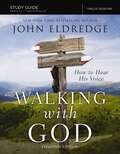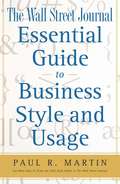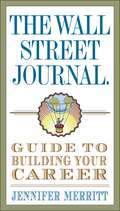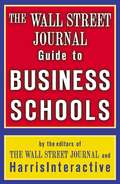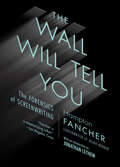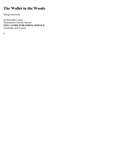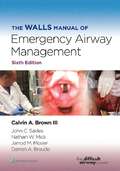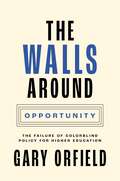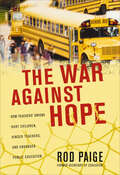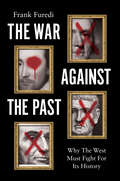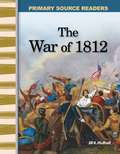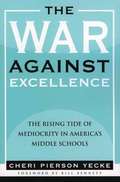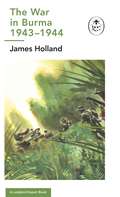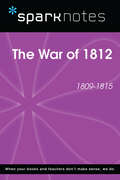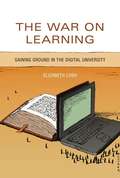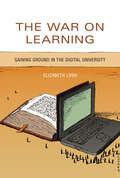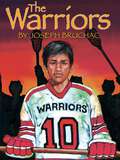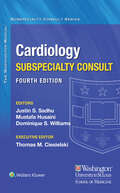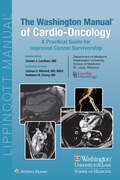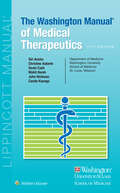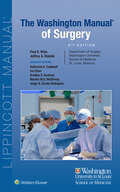- Table View
- List View
The Walking with God Study Guide Expanded Edition: How to Hear His Voice
by John Eldredge Craig McconnellOur deepest need is to live in conversation with God. To hear his voice. To follow him intimately. This is the most life-changing habit that we can adopt, because it brings us back to the source of life. Yet most Christians have never been taught how to have a conversation with the Creator. In this revised and updated study guide, bestselling author John Eldredge dives deeper into his personal journals to tell his stories about walking and talking with the Lord. By putting words to the things God has shown him through some amazing experiences, he will help you shed light on the miraculous truths that God is showing you right now. Packed with questions, stories, and discussion topics, this study guide features: Journaling Prompts: Questions to help you tell your own story of walking with God Relevant Passages: Scriptures to study and memorize to help you along the way Clarity Readings: Short notes to solidify certain key points in your mind Leader’s Guide: A new leader’s guide to help you guide groups through the material These stories and reflections will help you recall lessons you didn’t know had been forgotten, open up new horizons, and help you tell and interpret your own story of your walk with God. Includes a new study to accompany the new chapter added to the trade book.
The Wall Street Journal Essential Guide to Business St
by Paul MartinThe indispensable resource that has helped the writers and editors of The Wall Street Journal earn a reputation for the most authoritative business writing anywhere -- now fully expanded and revised for the twenty-first century In the field of business, the words you use -- and how you use them -- can either bolster your credibility or undermine your intelligence. For anyone who is faced with the task of writing a memo, report, proposal, press release or even an e-mail, The Wall Street Journal Essential Guide to Business Style and Usage is an invaluable one-stop resource. Originally intended exclusively for use by the paper's staff, the book is organized in a user-friendly A to Z format, with appropriate cross-referencing, that helps you solve almost any question of spelling, grammar, punctuation or word definition. For those seeking a competitive edge for succeeding in the world of business, The Wall Street Journal Essential Guide to Business Style and Usage is the definitive reference to keep close to your desk -- the last word for everyone who works with words.
The Wall Street Journal Guide to Building Your Career (Wall Street Journal Guides)
by Jennifer MerrittAre you looking for a mere job--the kind where you do virtually the same thing day after day, year after year, and spend the hours counting down the minutes until the clock hits five p.m.? Or are you looking for a career--the kind that engages your interests and passions, constantly presents new and exciting opportunities and challenges, and allows you to grow personally and professionally?If you chose the latter, this is the book for you. In The Wall Street Journal Guide to Building Your Career, former Wall Street Journal careers editor Jennifer Merritt shows you how to build the foundation for the fulfilling professional career that leads to that corner office. She'll walk you through how to:* Select and nab that important career-launching college internship* Ace your first interview--and blow them away in the second round* Navigate the unwritten rules of any office culture* Negotiate tastefully and successfully for the salary your skills are worth* Get that critical promotion when you're at the peak of your learning curve* Choose the mentor (or mentors) who can best help you achieve your goals* Leap ahead of other high achievers racing you to the topDrawing on advice from industry experts, career coaches, and ordinary people who've made the climb themselves, Merritt offers insider tips for landing and moving up in the kind of job that's not just about earning a paycheck but about realizing your ambitions and achieving the kind of success you've always dreamed of.
The Wall Street Journal Guide to Business Schools
by The Staff Wall Street Journal Harris InteractiveMost people return to business school for an M.B.A. degree to increase their marketability in a highly competitive business environment. How well they achieve their goal depends in large measure on how the business world views the schools they attended. For the first time ever, The Wall Street Journal, the world's most respected business publication, along with Harris Interactive, the organization that created the well-known Harris poll, tells you what corporate recruiters from a wide variety of fields think about the M.B.A. programs they know so intimately. Nearly two years in the making, this is the only major survey that focuses exclusively on the opinions of recruiters -- the buyers of M.B.A. talent. Twenty-seven variables for each school were evaluated, variables that drive a recruiter to hire a particular graduate, such as their company's long-term success with a school's M.B.A. graduates and the students' communication and interpersonal skills, analytical and problem-solving abilities and leadership potential. This groundbreaking volume used the evaluations of more than sixteen hundred recruiters, appraising twenty-seven variables for more than two hundred schools in order to arrive at statistically valid ratings for fifty U.S. and international M.B.A. programs, as well as recruiters' observations on thirty-five more business schools and brief profiles on an additional seventy schools. In addition to the overall rankings, The Wall Street Journal Guide to Business Schools ranks the best public and private schools, the top schools by region, the top large and small schools, the top schools on top attributes, schools that are "hidden gems" and business schools by industry. Also evaluated are schools' academic excellence, the collegiality (and competitiveness) of each school and the most important school attributes. The corporate recruiters even list their personal favorites...and go on the record with extremely candid observations about both the business schools and their graduates. The first guide to business schools published exclusively as an e-book, The Wall Street Journal Guide to Business Schools will prove to be an invaluable resource for prospective students, school faculty and administrators -- and recruiters themselves.
The Wall Will Tell You: The Forensics of Screenwriting
by Hampton FancherA completely original guide to the screenwriter's art -- as only the writer of Blade Runner could concieve it.The master speaks, in this unique guide for screenwriters -- and writers and artists of all kinds. In short paragraphs--oracular and enigmatic, hardhitting and concrete--the man Forbes called a "creative genius" writes a guide book like none other for the aspiring screenwriter. Learn how to write living, breathing characters, exciting action and plot, and develop your own artistic vision. And learn how to never compromise that vision, most importantly, with yourself.
The Wallet in the Woods (Making Connections-3)
by Meredith CostainWhile on a class field trip, Roberto finds a wallet in the woods. Roberto, Lucy, and Adam track a series of important clues as they try to identify the owner. Students focus on sequencing in this reader. Grade 3 Accelerated Reader Making Connections Comprehension Library readers engage students with appealing fiction and nonfiction titles. Students apply essential strategies and skills while reading engaging texts to build reading comprehension.
The Walls Manual of Emergency Airway Management
by John C. Sakles Calvin A. Brown Nathan W. Mick Jarrod M. Mosier Darren A. BraudeLong recognized as the gold standard emergency airway management textbook, The Walls Manual of Emergency Airway Management, Sixth Edition, remains the most trusted reference on this challenging topic. This practical reference, edited by Drs. Calvin A. Brown III, John C. Sakles, Nathan W. Mick, Jarrod M. Mosier, and Darren A. Braude, is the foundation text for these nationally recognized programs: The Difficult Airway Course: Emergency™, The Difficult Airway Course: Critical Care™, The Difficult Airway Course: EMS™, and The Difficult Airway Course: Residency Edition™. Its hands-on approach provides the concrete guidance you need to effectively respond wherever adult or pediatric airway emergencies may occur, including in and out of hospital settings, emergency departments, and urgent care centers.
The Walls around Opportunity: The Failure of Colorblind Policy for Higher Education (Our Compelling Interests #6)
by Gary OrfieldThe case for race-conscious education policyIn our unequal society, families of color fully share the dream of college but their children often attend schools that do not prepare them, and the higher education system gives the best opportunities to the most privileged. Students of color hope for college but often face a dead end.For many young people, racial inequality puts them at a disadvantage from early childhood. The Walls around Opportunity argues that colorblind policies have made college inaccessible to a large share of students of color, and reveals how policies that acknowledge racial inequalities and set racial equality goals can succeed where colorblindness has failed.Gary Orfield paints a troubling portrait of American higher education, explaining how profound racial gaps imbedded in virtually every stage of our children’s lives pose a major threat to communities of color and the nation. He describes how the 1960s and early 1970s was the only period in history to witness sustained efforts at racial equity in higher education, and how the Reagan era ushered in today’s colorblind policies, which ignore the realities of color inequality. Orfield shows how this misguided policy has resegregated public schools, exacerbated inequalities in college preparation, denied needed financial aid to families, and led to huge price increases over decades that have seen little real gain in income for most Americans.Drawing on a wealth of new data and featuring commentaries by Stella Flores and James Anderson, this timely and urgent book shows how colorblind policies serve only to raise the walls of segregation higher, and proposes real solutions that can make higher education available to all.
The Walls around Opportunity: The Failure of Colorblind Policy for Higher Education (Our Compelling Interests #8)
by Gary OrfieldThe case for race-conscious education policyIn our unequal society, families of color fully share the dream of college but their children often attend schools that do not prepare them, and the higher education system gives the best opportunities to the most privileged. Students of color hope for college but often face a dead end.For many young people, racial inequality puts them at a disadvantage from early childhood. The Walls around Opportunity argues that colorblind policies have made college inaccessible to a large share of students of color, and reveals how policies that acknowledge racial inequalities and set racial equality goals can succeed where colorblindness has failed.Gary Orfield paints a troubling portrait of American higher education, explaining how profound racial gaps imbedded in virtually every stage of our children&’s lives pose a major threat to communities of color and the nation. He describes how the 1960s and early 1970s was the only period in history to witness sustained efforts at racial equity in higher education, and how the Reagan era ushered in today&’s colorblind policies, which ignore the realities of color inequality. Orfield shows how this misguided policy has resegregated public schools, exacerbated inequalities in college preparation, denied needed financial aid to families, and led to huge price increases over decades that have seen little real gain in income for most Americans.Now with a new afterword that discusses the 2023 Supreme Court decision to outlaw affirmative action in college admissions, this timely and urgent book shows that the court&’s colorblind ruling is unworkable in a society where every aspect of opportunity and preparation is linked to race, and reveals the gaps in the opportunity pipeline while exploring the best ways to address them in light of this decision.
The War
by Guido Galeano Vega David A. SinghiserAll wars have their source in The War begun in heaven when Lucifer and his followers rebeld against God. Discover how this war touches you and how you should respond.
The War Against Hope: How Teachers' Unions Hurt Children, Hinder Teachers, and Endanger Public Education
by Rod PaigeA former US Secretary of Education addresses the crisis in public schooling and the role teachers’ unions have played in its decline. Something is terribly wrong with America’s public-school system. For decades, we have seen test scores slide or stagnate—today, fewer than twenty percent of our nation’s twelfth graders are proficient in math, and our students rank near the bottom in science and math among the industrialized nations of the world—and achievement gaps persist or widen.So who’s responsible for the ongoing failure of our education system? In The War Against Hope, former Secretary of Education Rod Paige pulls no punches in his critical analysis of America’s crisis in the classroom. Without question, the greatest impediment to meaningful school reform is the enormous, self-aggrandizing power wielded by the teachers’ unions.In this vital, well-documented book, Paige takes an unflinching look at the power-hungry union leaders who have consistently placed their ambitions ahead of the needs of the teachers and the students whom they claim to serve. He also traces the history of the National Education Association (NEA) from its humble beginnings as an advocate of education excellence to its early radicalization by left-wing ideology.The War Against Hope is a disturbing account of the corruption, greed, and skewed values that have assaulted our schools, betrayed our teachers, and forsaken our children for far too long.
The War Against the Past: Why The West Must Fight For Its History
by Frank FurediA war is being waged against the Past. Whether it’s toppling statues, decolonising the curriculum or erasing terms from our vocabulary, a cultural crusade is underway designed to render the past toxic. It is condemned as enemy territory and has become the target of venomous hate. What is at stake in provoking such a strong sense of societal shame towards Western history? In this book, Frank Furedi mounts a fierce defence of the past and calls for a fight back against the delegitimization of its ideals and accomplishments. Casting the past as a story of shame has become a taken-for granted outlook permeating the educational and cultural life of western society from the top down. Its advocates may see it as a cultural imperative, but a society that loses touch with its past will face a permanent crisis of identity. Squandering the wisdom provided by our historical inheritance means betraying humanity’s positive achievements. Challenging this great betrayal, Furedi argues, is one of the most important battles of our time.
The War Of 1812
by Jill K. MulhallIn this engaging nonfiction title, readers will learn about the War of 1812, the causes of it, and how it affected American citizens. Through detailed images, stunning facts, and easy to read text, readers are introduced to ideas and events that took place during this time, including embargoes, the Treaty of Paris, the War Hawks, and the Treaty of Ghent. Readers will have the opportunity to further enhance their understanding of the content through an accessible table of contents and glossary.
The War against Excellence: The Rising Tide of Mediocrity in America's Middle Schools
by Cheri Pierson YeckeIn <i>The War against Excellence</i>, veteran teacher Cheri Pierson Yecke details the chronological history of the middle school movement in the U. S. by tracing its evolution from academically-oriented junior high schools to the dissolution of academics in the middle schools of the late 1980s and beyond. Evidence is presented to show how leaders of this movement designed to use the middle school as a vehicle to promote non-academic goals, contrary to the desires of parents and the community. Favored instructional practices―such as the elimination of ability grouping and the rise in cooperative learning and peer tutoring―have produced coerced egalitarianism, where education performance is equalized by bringing the achievement of gifted and high ability students down to the level of mediocrity.
The War in Burma 1943-1944: (WW2 #10) (The Ladybird Expert Series #16)
by James HollandBOOK 10 OF THE LADYBIRD EXPERT HISTORY OF THE SECOND WORLD WAR, FROM AWARD-WINNING HISTORIAN JAMES HOLLANDFeaturing stunning illustrations from Keith Burns, bringing the story to life in vivid detailWhy were British troops in Burma?What was The Defence of the Admin Box?How did the British defeat the Japanese troops?THE BURMA CAMPAIGN was one of the most prolonged campaigns in the South-East Asian theatre of war, but it was also one of the most dramatic.Against Japanese troops, and monsoon weather, the Allies finally prevailed, demonstrating to the world that the Axis powers could be defeated in the East.BRITAIN'S TURNING POINT IN THE WAR IN THE EASTWritten by historian, author and broadcaster James Holland, The War in Burma is an essential, accessible introduction to Britain's triumph in the East.__________Discover the full Ladybird Expert WW2 series:BlitzkriegThe Battle of BritainBattle of the AtlanticThe Desert WarThe Eastern FrontThe Pacific WarThe Bomber WarThe War in ItalyThe Battle for NormandyThe War in BurmaVictory in EuropeVictory Against Japan
The War in Italy: (WW2 #8) (The Ladybird Expert Series #14)
by James Holland* PRE-ORDER YOUR COPY NOW *- Why did the Allies decide to invade Southern Italy?- How did the weather and Italian terrain complicate the fighting?- How did General Mark Clark's Allied Armies win the final battle?Discover the mounting conflict and complex campaigns of the war in Italy. From Operation HUSKY to Clark's final offensive, the Allied campaign tightened the noose around Nazi Germany and saw the end of Italian Fascism, though it was at a cost of high civilian casualty and destruction.AN EPIC OF GRIT, DETERMINATION AND SACRIFICEWritten by historian, author and broadcaster James Holland and with immersive illustrations by Keith Burns, THE WAR IN ITALY 1943-1945 is an accessible and enthralling introduction to these critical battles and their impact on the outcome of World War II
The War of 1812 (SparkNotes History Notes)
by SparkNotesThe War of 1812 (1809-1815) (SparkNotes History Note) Making the reading experience fun! SparkNotes History Guides help students strengthen their grasp of history by focusing on individual eras or episodes in U.S. or world history. Breaking history up into digestible lessons, the History Guides make it easier for students to see how events, figures, movements, and trends interrelate. SparkNotes History Guides are perfect for high school and college history classes, for students studying for History AP Test or SAT Subject Tests, and simply as general reference tools.Each note contains a general overview of historical context, a concise summary of events, lists of key people and terms, in-depth summary and analysis with timelines, study questions and suggested essay topics, and a 50-question review quiz.
The War on Learning
by Elizabeth LoshBehind the lectern stands the professor, deploying course management systems, online quizzes, wireless clickers, PowerPoint slides, podcasts, and plagiarism-detection software. In the seats are the students, armed with smartphones, laptops, tablets, music players, and social networking. Although these two forces seem poised to do battle with each other, they are really both taking part in a war on learning itself. In this book, Elizabeth Losh examines current efforts to "reform" higher education by applying technological solutions to problems in teaching and learning. She finds that many of these initiatives fail because they treat education as a product rather than a process. Highly touted schemes -- video games for the classroom, for example, or the distribution of iPads -- let students down because they promote consumption rather than intellectual development. Losh analyzes recent trends in postsecondary education and the rhetoric around them, often drawing on first-person accounts. In an effort to identify educational technologies that might actually work, she looks at strategies including MOOCs (massive open online courses), the gamification of subject matter, remix pedagogy, video lectures (from Randy Pausch to "the Baked Professor"), and educational virtual worlds. Finally, Losh outlines six basic principles of digital learning and describes several successful university-based initiatives. Her book will be essential reading for campus decision makers -- and for anyone who cares about education and technology.
The War on Learning: Gaining Ground in the Digital University (The\mit Press Ser.)
by Elizabeth LoshAn examination of technology-based education initiatives—from MOOCs to virtual worlds—that argues against treating education as a product rather than a process.Behind the lectern stands the professor, deploying course management systems, online quizzes, wireless clickers, PowerPoint slides, podcasts, and plagiarism-detection software. In the seats are the students, armed with smartphones, laptops, tablets, music players, and social networking. Although these two forces seem poised to do battle with each other, they are really both taking part in a war on learning itself. In this book, Elizabeth Losh examines current efforts to “reform” higher education by applying technological solutions to problems in teaching and learning. She finds that many of these initiatives fail because they treat education as a product rather than a process. Highly touted schemes—video games for the classroom, for example, or the distribution of iPads—let students down because they promote consumption rather than intellectual development.Losh analyzes recent trends in postsecondary education and the rhetoric around them, often drawing on first-person accounts. In an effort to identify educational technologies that might actually work, she looks at strategies including MOOCs (massive open online courses), the gamification of subject matter, remix pedagogy, video lectures (from Randy Pausch to “the Baked Professor”), and educational virtual worlds. Finally, Losh outlines six basic principles of digital learning and describes several successful university-based initiatives. Her book will be essential reading for campus decision makers—and for anyone who cares about education and technology.
The Warriors (Exceptional Reading And Language Arts Titles For Intermediate Grades Ser.)
by Joseph BruchacWhen twelve-year-old Jake Forrest's mother gets a job in a new city, everything changes. He has to move away from the Iroquois reservation he's lived on his entire life—away from his aunt and uncle, and away from the friends he plays lacrosse with. The lacrosse coach and players at his new school in Washington, D.C., believe that winning is everything, and they don't know anything about the ways of his people. As Jake struggles to find a place where he truly belongs, tragedy strikes and he must find out who he really is. Can he find courage to face the warrior within—the warrior who values peace and leads other to more noble pursuits than outscoring the opposition?
The Washington Manual Cardiology Subspecialty Consult
by Justin Sadhu Mustafa Husaini Dominique WilliamsConcise, portable, and user-friendly, The Washington Manual® Cardiology Subspecialty Consult, Fourth Edition, provides essential information on inpatient and outpatient management of common diseases and disorders. Edited by Drs. Justin S. Sadhu, Mustafa Husaini, and Dominique S. Williams, this edition offers state-of-the-art content on disease pathophysiology, diagnostic tools, and management options, including new biomedical discoveries and novel therapeutics. Ideal for residents, fellows, and practicing physicians who need quick access to current scientific and clinical information in cardiology, the manual is also useful as a first-line resource for internists and other primary care providers.
The Washington Manual of Cardio-Oncology: A Practical Guide for Improved Cancer Survivorship
by Joshua Mitchell Daniel J Lenihan Kathleen ZhangWritten by experts in cardiovascular disease, hematology, and oncology, The Washington Manual® of Cardio-Oncology: A Practical Guide for Improved Cancer Survivorship is a clinically relevant, easy-to-use primer on the detection, management, and improved cardiovascular-based patient outcomes in adults undergoing treatment for cancer or who have previously survived cancer therapy. Edited by Drs. Daniel J. Lenihan, Joshua D. Mitchell, and Kathleen W. Zhang, this concise yet comprehensive manual provides high-yield information that reflects today’s advances in risk stratification, early diagnosis, and treatment of cardiovascular disease—all in an easy-access, concisely bulleted format for on-the-go reference.
The Washington Manual of Medical Therapeutics
by Siri Ancha Christine Auberle Cash Devin Mohit HarshThe Washington Manual® of Medical Therapeutics, 37th Edition, provides essential information you need for successful patient care, with concise, high-yield content that reflects today’s fast-changing advances in medical technology and therapeutics. Written by faculty, residents, and fellows and edited by chief residents of the distinguished Washington University School of Medicine in St. Louis, the Washington Manual presents brief, logical approaches to diagnosis and management of commonly encountered medical conditions, including new therapies that improve patient outcomes. Discover why housestaff and faculty around the world depend on this best-selling resource for day-to-day clinical practice in internal medicine.
The Washington Manual of Outpatient Internal Medicine
by Maureen Lyons Peter McDonnell Jennifer SchmidtFocusing on the essential information you need to know for the most commonly encountered problems in outpatient internal medicine, this practical volume in the Washington Manual® series provides concise, high-yield content that reflects today’s advances in patient evaluation and management. In one convenient, portable resource, you’ll find complete coverage of everything from hypertension and diabetes to sleep disorders, nutrition, and care of the cancer patient—all at your fingertips for quick review and reference. Edited by Drs. Maureen D. Lyons, Peter J. McDonnell, and Jennifer M. Schmidt, The Washington Manual® of Outpatient Internal Medicine, 3rd Edition, is an excellent companion to the Washington Manual® of Medical Therapeutics, which thoroughly covers inpatient care.
The Washington Manual of Surgery
by Jeffrey A. Blatnik Paul E. WiseFocusing on must-know information in the broad spectrum of general surgery, The Washington Manual® of Surgery, 9th Edition, provides concise, high-yield content essential for surgical residents, attendings, medical students, and others who provide care for patients with surgical disease. Edited by Drs. Paul E. Wise and Jeffrey A. Blatnik, and written by teams of Washington University residents and faculty, this bestselling manual presents state-of-the-art, comprehensive information in a brief, outline format, along with numerous figures, tables, algorithms, and images throughout. In one convenient, portable resource, you’ll find practical coverage of all surgical subspecialties (thoracic, GI, colorectal, cardiac, vascular, breast, trauma, critical care, and more)—all at your fingertips for quick review and reference.
